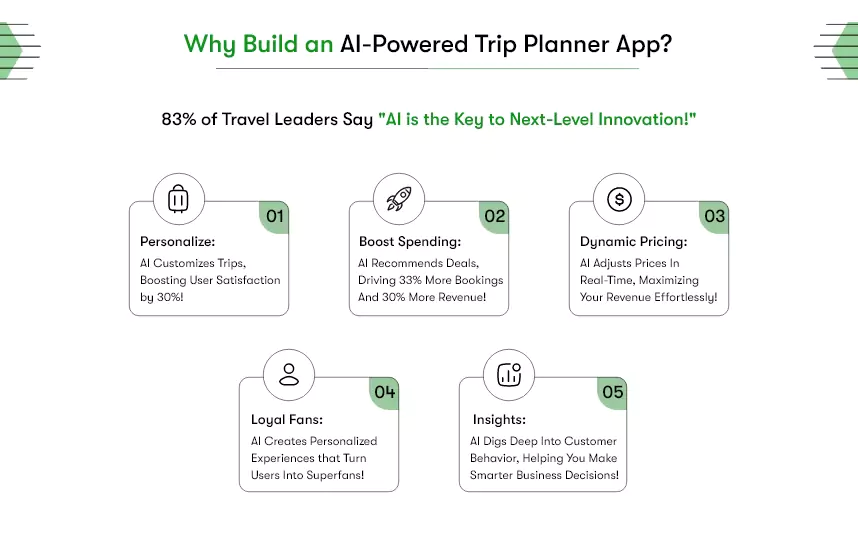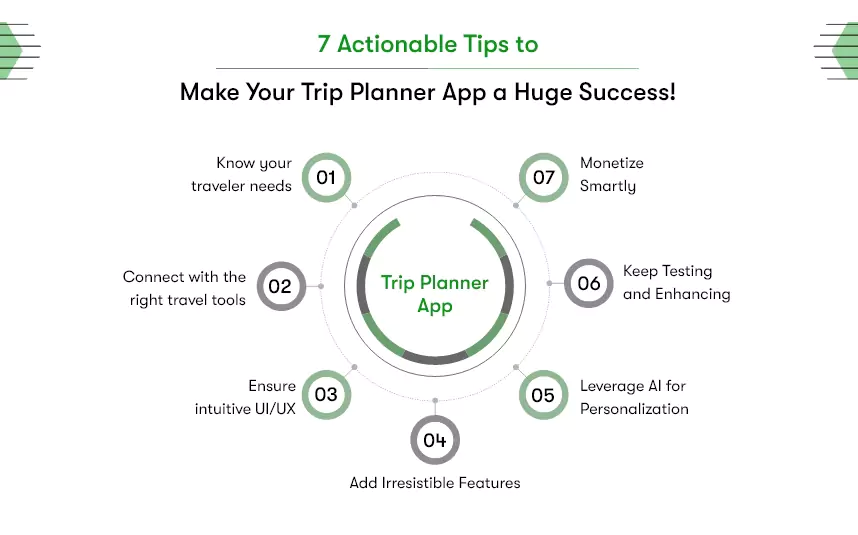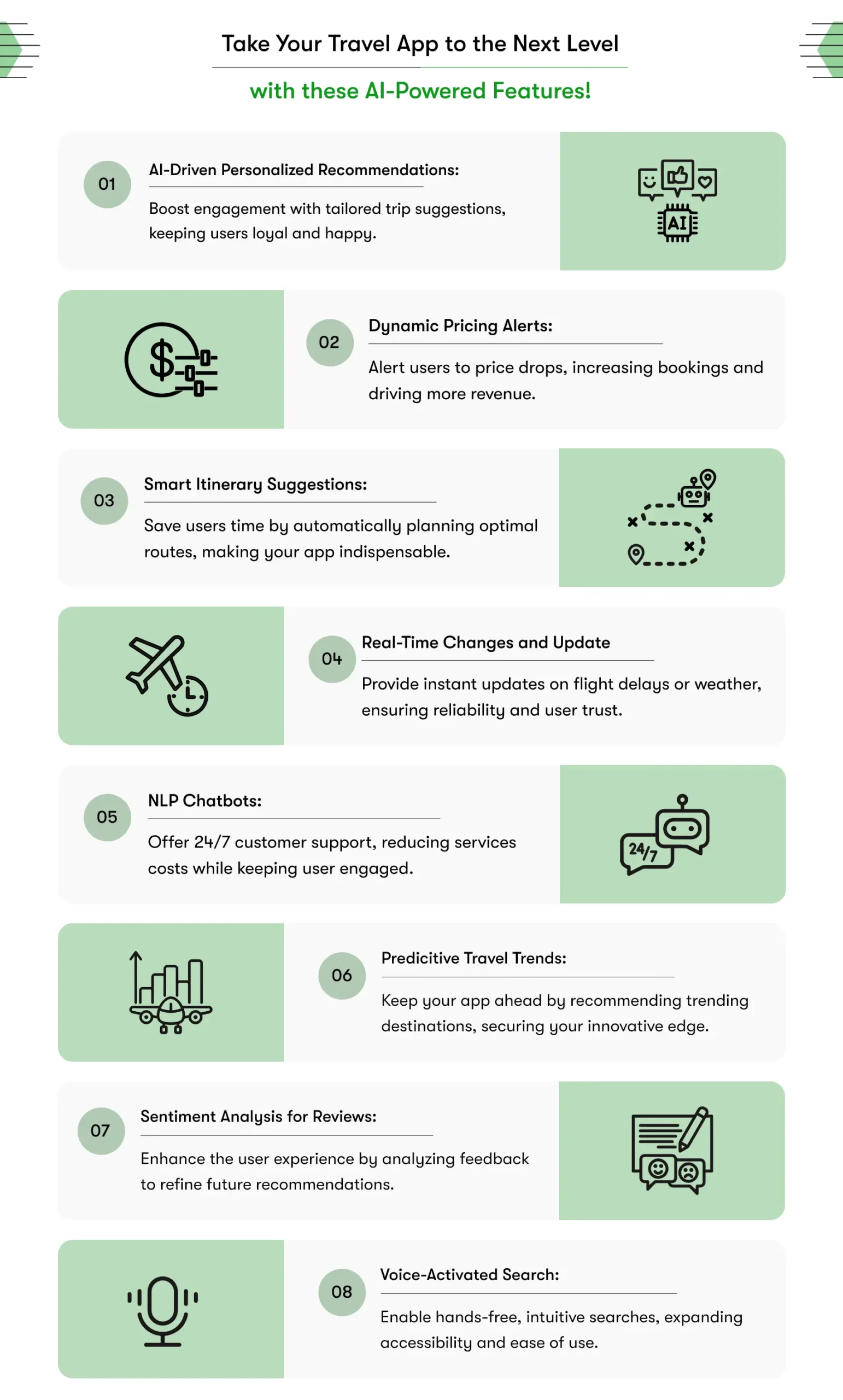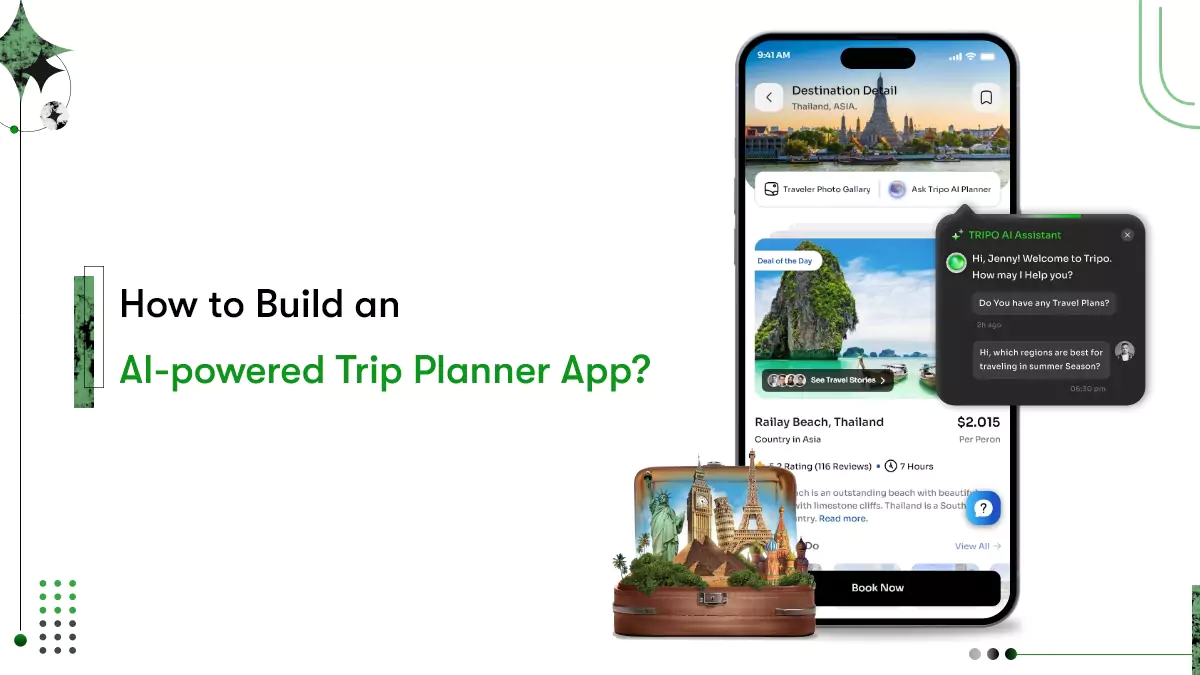83% of travel businesses believe that AI is essential for innovation in the industry, and 61% of travel companies have plans to implement AI within the next three years to enhance customer experience. – Worldmetrics.
By building AI trip planner apps, businesses offer their customers a personal travel assistant. AI simplifies sorting through tons of data in seconds to find the best deals, suggest cool activities, and give real-time updates to travelers. For your travel business, this could mean turning one-time clients into regulars because you’re offering something unique and super convenient.
Talking about the Middle East, where tech adoption is on the rise, an AI trip planner app can really set you apart from competitors. It can help you tap into a market hungry for smarter travel solutions. While several established players are in the market, there is still room for innovation and differentiation.
With AI and its subsets (predictive analytics, Natural Language Processing, Generative AI, etc.), you can make trip planning fun and easy for customers. By harmonizing your unique selling points and the power of AI, you can create a competitive advantage and build a successful AI-powered trip planner app.
Is this something you’d want to dive deeper into? There’s a lot more to explore, from how to develop trip-planning apps to how they could fit seamlessly into your existing business. If you’re curious, as a travel app development company, let us guide you through what it might take to get started.
Why build an AI-powered trip planner app?
An AI-powered trip planner app differs from other travel apps because it goes beyond just booking flights or hotels. Traditional apps might require users to search for and compare options manually. However, an AI trip planner app automatically gathers information based on user preferences, like budget, past trips, browsing history, and interests, to create a customized travel itinerary.
Hence, travel companies can offer hyper-personalized trip-planning experiences, securing the first spot in their customer minds.
Furthermore, with the predictive and data analytics ability, an AI trip planner app can also suggest the best times to visit and recommend activities that match traveler tastes. If something changes, the app can notify travelers instantly, helping them adjust their plans in real time and saving the travel company’s reputation.

Benefits of AI trip planner app over traditional trip planners:
- Personalization: AI tailors the trip to each customer’s likes and needs and can boost satisfaction by up to 20-30%.
- Customer spending: AI-powered recommendation engines can help you increase hotel bookings by 33% and visitor spending by 30%.
- Dynamic pricing: AI-driven dynamic pricing strategy to optimize travel service expenses in your trip planner app can potentially increase bookings and your revenue.
- Brand loyalty: Personalized recommendations, deals, and experiences on your trip planner app driven by AI can convert users into long-term customers.
- Customer insights: Artificial Intelligence in your trip planner app can analyze customer data, behavior, and even how much time customers spend on what tabs and provide actionable insights to understand your audience and make informed decisions.
So, are you excited to know how to build an AI-powered Trip Planner app? Let’s get to it.
How to build an AI Trip Planner app?
Developing an AI trip planner app required careful planning and brainstorming sessions with the experts. You need to have clear objectives, goals, target audience, and how you want to stand out in the market. So, let us dive into the AI trip planner app development steps.
Start by clarifying what you want your app to achieve.
Are you aiming to create a personalized trip planner, a travel guide, or a hotel booking tool? Because this decision will guide the entire development process.
For a personalized trip planner, your goal should be to offer tailored itineraries that anticipate users’ needs, providing a seamless experience that feels uniquely designed for them. Take the ultimate guide to travel app development for more clarity.
Navigate the Competitive Landscape
As they say, knowing your competitors is essential for long-term business success. Hence, you must dive into market research to understand the competitive landscape. Explore existing top travel apps like Google Travel and TripIt. Use them extensively to identify their strengths and weaknesses.
For example, if you notice that Google Travel excels in suggesting optimal travel times, consider how you can offer similar or enhanced features in your app. Understanding what works well and what doesn’t will help you position your app to stand out and offer superior value.
List down your trip planner app features
Determine which features will set your app apart. Consider options such as personalized itineraries, real-time updates, or budget management tools that use AI to offer an all-in-one solution to travelers. Don’t forget to review your favorite travel apps and note features that impressed you.
For instance, TripIt’s real-time flight updates could inspire you to integrate similar functionality. Aim to meet user expectations and provide added features that surprise and delight.
Hire Experienced Developers
With your feature list in hand, it’s time you find talent to make your AI trip planner application. While hiring freelancers is an option, partnering with a reputable travel app development company might be more effective.
You should look for a team with experience in creating various types of apps for the travel industry, such as Expedia or Skyscanner. A professional team makes all the difference with their expertise in project management, development, design, and testing to bring your vision to life.
Take Your Project Off the Ground
The development phase begins with clear communication of your ideas to the team. And if you have hired experienced developers, they will help refine your concept. Then, the development process starts with wireframing, which outlines the app’s layout.
Next, the design phase gives the app its visual identity, and developers code and integrate AI into app features to make it functional. Once your AI trip planner app is built, it goes through extensive testing to ensure everything works as intended before launching on platforms like the App Store or Google Play.
Make Buzz About Your AI-Powered Trip Planner App
Having a feature-rich app is just the beginning—getting people to notice is key. Use a marketing mix to create a sound marketing plan and promote your app to reach the right audience.
You can also consider strategies such as collaborating with travel bloggers, running targeted social media ads, or initiating promotions in travel forums. If your app truly enhances the travel experience, word will spread; your job is to make sure it reaches the right audience.

Actionable tips to make your Trip Planner App Development a huge success!
1. Know Your Travelers’ Needs
Get to know who will be using your app. Research their travel habits, what they like and dislike, and what they need from a travel app. This helps you design features that truly matter to them.
For example, if your target users love adventure travel but struggle with itinerary planning, offer easy ways to discover and book adventure activities. Case in point: TripIt’s success comes from understanding travelers’ needs for organized itineraries and real-time updates.
2. Connect with the Right Travel Tools
Link your app to essential travel services like flight booking, hotel reservations, and maps. This ensures users get accurate and up-to-date information. For instance, integrating with flight APIs lets users see live flight details, making your app a one-stop shop for their travel needs. Companies like Skyscanner excel by integrating various travel services to offer comprehensive booking options.
3. Create a User-Friendly Experience
Design your app to be intuitive and simple. Include features like easy booking management, customizable itineraries, and options to discover new places. Make sure it’s accessible on mobile, tablet, and web. For example, Google Trips offers a clean, easy-to-navigate interface that helps users organize their travels effortlessly.
4. Make your AI Trip Planner App Irresistible with Futuristic Features
Features are key to making your AI trip planner app stand out from competitors. So, there will be two types of features that your trip planner would need: basic features to make your app functional and advanced features that will convert users into loyal customers. Here’s the list of both types of features for your reference.
Must-have Trip Planner App Features
| Category | Feature | Description |
| Exploration | Search and Filter Options | Allows users to search for flights, hotels, and activities, filtering results by price, location, or rating. |
| Map Integration | Provides location-based services, showing nearby attractions, restaurants, and hotels. | |
| Destination Guides | Offers detailed information on various destinations, including travel tips, local culture, and must-see attractions. | |
| Profile | User Registration and Profiles | Enables users to create accounts, store personal details, and access travel history. |
| Saved Preferences | Allows users to save their travel preferences, such as favorite airlines, hotel chains, or types of activities. | |
| Travel History | Tracks past trips and stores itineraries, bookings, and personal notes for easy reference. | |
| Travel Products | Booking System | Integration with booking engines for flights, hotels, and activities directly within the app. |
| Itinerary Management | Users can create and manage trip itineraries, adding flight times, hotel check-ins, and activity schedules. | |
| Payment Gateway Integration | Secure payment options for booking and in-app purchases, ensuring safe transactions. | |
| Updates | Notifications and Alerts | Sends reminders about flight times, hotel check-ins, and other important details. |
| Real-Time Updates | Provides live updates on flight statuses, weather conditions, and changes in travel plans. | |
| Local Event Updates | Alerts users to events happening in their destination, such as festivals, concerts, or seasonal attractions. | |
| User-Specific | Personalized Recommendations | Suggests destinations, hotels, and activities based on user preferences and past behavior. |
| Language Support | Offers multi-language support for users from different regions. | |
| Customer Support Access | Easy access to customer support, including options like chat, email, or phone. | |
| Functionality Specific | Offline Access | Allows users to access their itineraries and important details without an internet connection. |
| Multi-Currency Support | Displays prices in the user’s preferred currency for easier decision-making. | |
| Integration with Calendar | Syncs travel plans with the user’s calendar app for better organization. |
Advanced Features for an AI-powered Trip Planner App
- AI-Driven Personalized Recommendations: Increases user engagement and retention by offering tailored suggestions.
- Dynamic Pricing Alerts: Boosts bookings by alerting users to price drops.
- Smart Itinerary Suggestions: Saves user time, encouraging reliance on your app.
- Real-Time Changes and Updates: Enhances reliability with instant updates on travel changes.
- NLP Chatbots: Reduces support costs while keeping users engaged 24/7.
- Predictive Travel Trends: Positions your app as innovative by suggesting new destinations.
- Sentiment Analysis for Reviews: Improves user satisfaction by refining recommendations based on real feedback.
- Voice-Activated Search: Expands your app’s appeal with hands-free, user-friendly searches.

5. Use AI to Personalize and Assist
Employ AI to tailor recommendations and provide real-time support. Use machine learning to suggest activities based on user preferences and natural language processing for smart, conversational interfaces. AI can also help with dynamic itinerary adjustments. Look at how Hopper uses AI to predict flight prices and suggest the best times to book.
6. Test and Improve Continuously
Launch with a basic version of your app to gather user feedback and make improvements. Regularly update the app based on what users say and how they interact with it. Ensure it works well on all devices and meets security standards. Like Airbnb, which continuously refines its app based on user data and feedback, your ongoing adjustments will keep your app relevant and effective.
7. Monetize Smartly
You can generate decent ROI from your AI trip planner app development. Basically, travel apps make money through charges from hotels, airlines, and other travel services by offering hotels, flights, and other travel booking services.
But that’s not all. Multiple monetization models are available for your AI trip planner app to generate revenue, such as –
- Affiliate marketing,
- In-app booking,
- Commission,
- Premium Features.
Hence, you can choose monetization models that align with your travel services. For example, apps like TripAdvisor use affiliate partnerships for bookings while offering a mix of free and paid services to maximize earnings.

How much does Trip Planner App development cost?
From $30,000 to $150,000 or more, the cost of developing a trip planner app can vary widely depending on a number of factors. From the app’s complexity, features, and the region where your development team is based, such factors directly affect the AI-powered trip planner app development cost.
So, let us look into to what extent such factors can affect your budget for the travel app development cost. if you are building…
- Basic App: $30,000 to $50,000
- Medium Complexity App: $50,000 to $100,000
- High-End App: $100,000 to $150,000+
Other Factors Affecting Your Budget:
- Features and Functionality: Advanced features like AI-driven recommendations, real-time updates, and voice-activated search will increase your development cost.
- Design Complexity: Moreover, custom designs, user interface (UI) intricacies, and animations to make your app aesthetic can raise the budget.
- Platform: Developing for multiple platforms (iOS, Android, Web) simultaneously will cost more than focusing on one if you choose native app development. However, cross-platform app development with Flutter can save you time and money.
- Integration: You will need to integrate payment gateways, map APIs, booking engines, and more which may also raise the cost.
- Maintenance: Ongoing updates and maintenance after launch are crucial and you cannot overlook them. Based on your development team, it may or may not be included in your package.
Coming to Hiring In-House vs. Outsourcing Development:
- In-House Development:
- Pros: You get full control over the project, immediate communication, and the ability to build a long-term team.
- Cons: You will face higher costs due to salaries, benefits, office space, and equipment.
- Outsourcing Development:
- Pros: You get cost-effective options, access to global talent, and flexible engagement models to choose from.
- Cons: There are no such challenges that can’t be overcome since outsourcing companies take care of communications and time zones through various solutions.
Outsourcing Rates:
- Asia (e.g., India, Philippines): $20-$40/hour
- Eastern Europe (e.g., Ukraine, Poland): $50-$90/hour
- Latin America (e.g., Brazil, Argentina): $45-$70/hour
- Western Europe & North America: $80-$150/hour
Now if you want a cost-effective trip app development solution without compromising quality, consider the following when Outsourcing:
- Experience: Choose a company with a proven track record in developing similar apps.
- Portfolio: Review previous work to ensure their design and functionality standards match your expectations.
- Communication: Ensure there are clear communication channels and regular updates.
- Timezone Compatibility: Consider the overlap in working hours for smoother collaboration.
Outsourcing can significantly reduce costs while providing access to skilled developers, especially if you partner with a reputable company in a region with competitive rates. However, make sure to thoroughly vet any potential outsourcing partner to avoid quality and communication issues.
Outsource your AI Trip Planner App to Kody Technolab Ltd for Assured Success!
53% of Gen Z and 57% of Millennials prefer personalized travel planning aided by AI travel planning tools. Study.
Artificial Intelligence is a must tech to leverage in the travel industry. At Kody Technolab, we specialize in AI trip planner app development, combining cutting-edge technology with intuitive design to create apps that meet user expectations. Our experienced team provides personalized solutions to match your needs, whether you require a straightforward app or a sophisticated platform with advanced features.
Choosing Kody Technolab means you’ll have access to a global talent pool at competitive rates. With Kody Technolab, you’re not just getting a development team—you’re gaining a partner committed to your success.











 Contact Information
Contact Information